Performance Rocketry Competitor 4
Performance Rocketry - Competitor 4 {Kit}
Contributed by Kyle Cornelius
| Construction Rating: | starstarstarstarstar_border |
| Flight Rating: | starstarstarstarstar |
| Overall Rating: | starstarstarstarstar_border |
| Manufacturer: | Performance Rocketry  |
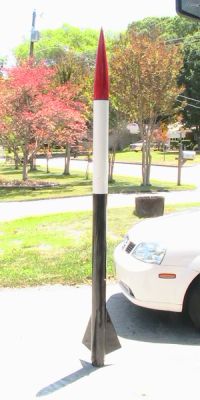
Brief:
This review is for an all fiberglass high performance rocket made by Performance Rocketry. It stands almost 8' tall
and 4" in diameter. I tend to overbuild so mine came out a little heavier than most, 15lbs without motor. Dual
deployment is a must with this rocket.
Construction:
This kit comes with the following parts:
- 4' fiberglass body tube with fin slots
- 2' fiberglass payload tube
- 5:1 ogive fiberglass nosecone
- 3 G10 fins, 3/16"
- 11" long fiberglass coupler
- 2 G10 bulkplates
- 2 G10 coupler plates
- G10 bulkplate for nosecone
- 2' fiberglass 75mm motor mount
- 3 G10 4"x75mm centering rings
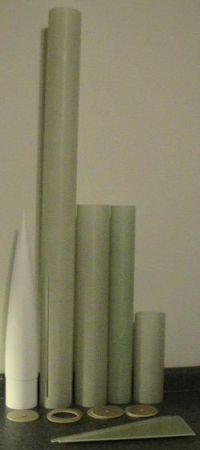
As you can see, the parts list is very minimal, which makes this kit very customizable.
No instructions are included, but if you're building this rocket, you should have an idea of what you are doing. I first test fit all of the parts. The only issue here was the fin slots. All of the slots started straight at the bottom but curved to the right as it got farther up the tube. There was no way the fins were going to fit without adjustment. I took the booster tube out to the garage and went back and forth down the slots with a drill bit connected to the Dremel until they were all straight and accepted the fins easily. (This was the best idea I could come up with at the time as I'm sure there's a better way to true up the slot.) After this, I sanded every part very thoroughly using 60 grit sandpaper on the fin roots and centering rings and a flap wheel sander connected to a power drill to sand the inside of the airframe. Next, I dry fit the motor mount/booster assembly and marked on the motor tube where I wanted the top 2 centering rings then epoxied them to the motor mount tube. After this had cured, I applied a large amount of JB Weld to the top of the forward centering ring and shoved it up into the booster tube until the bottom of the motor tube was flush with the bottom of the body tube and the middle centering ring was right above the fin slots. I then reached from the top of the body tube and spread the JB Weld around with a gloved finger making sure to get the centering ring/body tube joint coated well. When this had cured, the back centering ring was temporarily installed to keep the motor mount centered in the body tube while the fins were being tacked into place. A fin jig was used to ensure the fins were straight. Next, the back centering ring was removed and tape was applied to the outside fin/body tube joints to prevent the epoxy from leaking while applying internal fillets. 2 pumps of West Systems epoxy and slow hardener was mixed with chopped fiberglass and poured into the back of the rocket. The rear centering ring was then reinstalled and pushed in until it reached the back of the fins. I then rotated the rocket to ensure that everything had been coated with epoxy then left it sitting upside down to cure. The tape was then removed and showed that there were no leaks of epoxy. I then mounted a screw eye onto the center of a bulkhead and used JB Weld to attach this assembly 12" down into the booster tube. West Systems was poured on the bulkhead for insurance. This would act as the shock cord attachment point for the drogue but also limits the motor size to the 75/6000 case (however, it could fit a 7600 case without the bulkhead). If I was building it again, I would epoxy a short "leader cord" of strong tubular Kevlar® directly to the motor mount or just attach the shock cord to an eye bolt mounted on the forward closure of the case. After this, a final centering ring of wood was added to the very aft of the tube and holes were drilled for the Aeropack 75mm retainer. I then assembled the electronics bay using a very basic and common design. I have dual altimeters running in this rocket, a PerfectFlite MAWD and a PerfectFlite HiAlt-45. I used Missile Works switches mounted on aluminum standoffs on the sled and are easily accessible with the screw driver from the vent holes. When the bay was finished, it was back to work on the rocket. The nose cone bulkhead was mounted past the shoulder and epoxied heavily into place, and holes were drilled for rail buttons. I drilled 2 holes at each button location--one for small rail buttons and one for large rail buttons just in case I need to change out in the middle of the field. Next, external fillets were applied, but I wasn't happy with how they came out so another layer was applied, which looked much better. After this, vent holes, screw holes, and shear pin holes were drilled in their respective locations. The structural rocket was now complete.
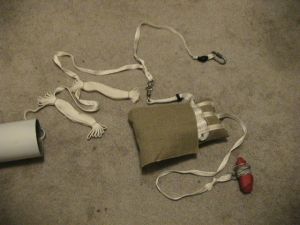
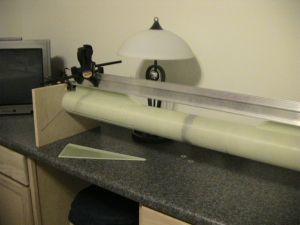
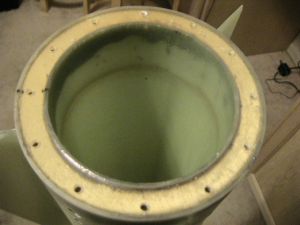
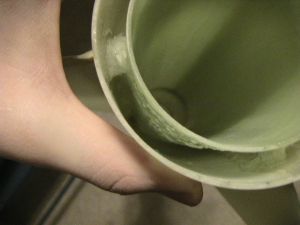
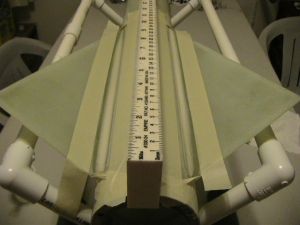
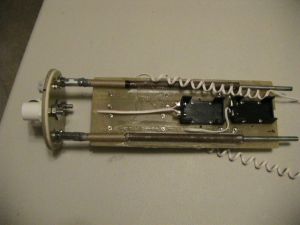
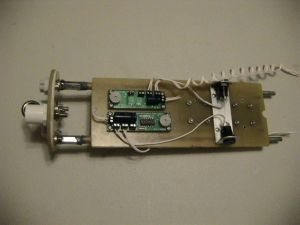
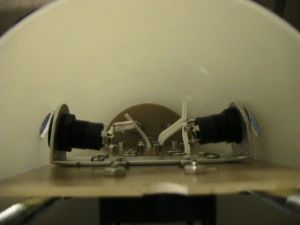
Finishing:
I didn't do anything special in the finishing process. 3 heavy coats of Rustoleum primer, sanding in between. Then 3
coats of Krylon flat black on the booster, 3 coats of Krylon white on the payload, and 2 coats of Krylon white followed
by 2 coats of Krylon Red on the nosecone. After letting this sit for a few days, PPG 2 part Automotive clear was added
to the whole rocket. Very shiny and looked quite cool. The auto paint is very durable, so the paint underneath is
protected.
Construction Rating: 4 out of 5
Flight:
This rocket flew this for the first time at Southern Thunder 2007 in Manchester, Tennessee. It flew with an AMW
K700BB in the "Crazy Jim" drag race. There were actually 8 people who wanted to participate, but only 4 pads
available for us to use. I was in the first round along with Jim Hendricksen with a Competitor 4 on a K700BB, Tim Lehr
with a Mad Dog on a J365SK, and Steve Temple with a 4" Patriot on a K555SK. Some copper thermite igniters were
made up for us by John Clifton. These things were awesome and lit all of the motors at the same time right as the LCO
said zero. The liftoff was awesome and the 4 rockets climbed to apogee.
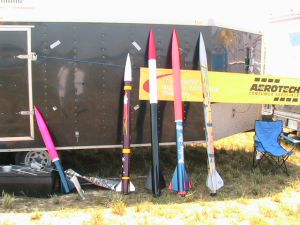
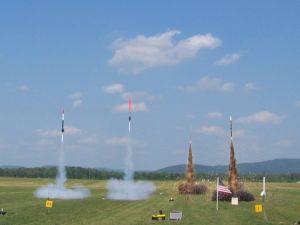
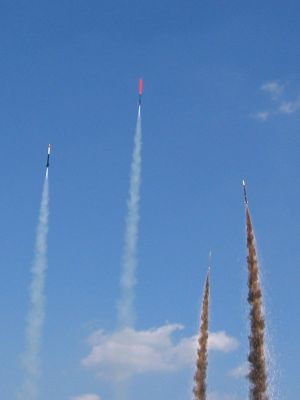
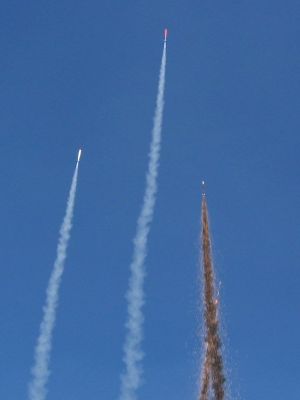
Recovery:
The 2 altimeters did their job and deployed the drogue at apogee. Then the rocket fell until the first main charge
went off at 700' followed by the backup at 500'. The main parachute was a SkyAngle Classic 2 60", which provided a
comfortable decent rate for the 15lb rocket. My dad had made a D-bag out of Nomex®
cloth and Kevlar®,
which worked like a charm. I used a 20" pilot chute to pull the main out of the D-bag. The altimeters reported
4,411' and 4,352'. Excellent flight and all of the rockets in the drag race returned safely. Video of the flight on
YouTube.
Flight Rating: 5 out of 5
Summary:
This is an excellent kit for someone who has experience building high power rockets. The price is very good (around
$200). I know Performance Rocketry has some customer service issues, but if you go through Wildman Rocketry like I did,
you shouldn't have any problem getting your kit or parts. This kit is worth the money and will last for many flights.
Overall Rating: 4 out of 5
Other Reviews
- Performance Rocketry Competitor 4 By Jason Vennard
This is an all fiberglass, high performance sport rocket. It is a basic kit for the experienced rocketeer as it is short any recovery hardware, harnesses, and/or parachutes, all of which you'll have to provide yourself. The kit includes a nice 4" fiberglass nosecone, two fiberglass body tubes, fiberglass motor tube, 3 fiberglass centering rings, a fiberglass coupler, a fiberglass sled for ...
 |
 |
Flights
 |
 |
J.F. (December 6, 2007)
Sponsored Ads
 |
 |












unknown (October 19, 2006)